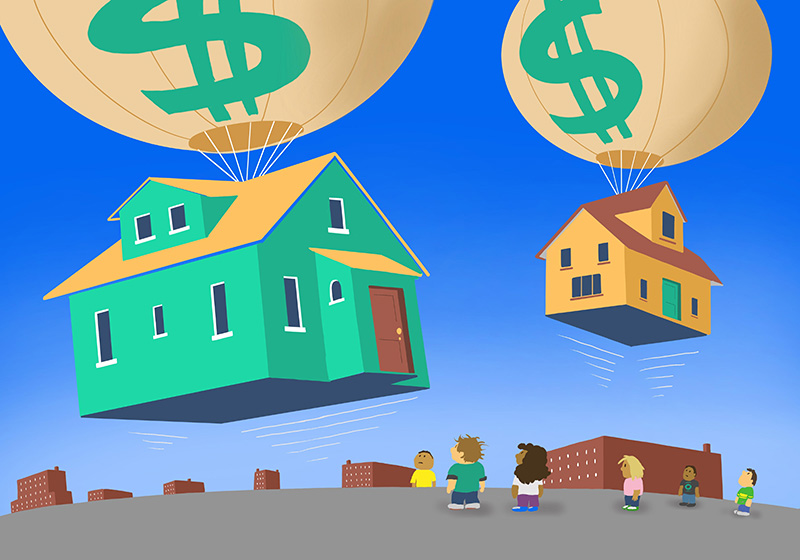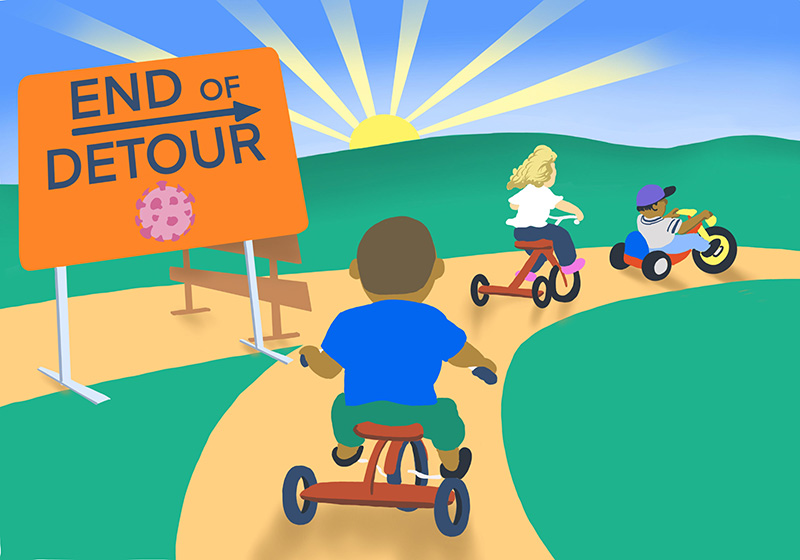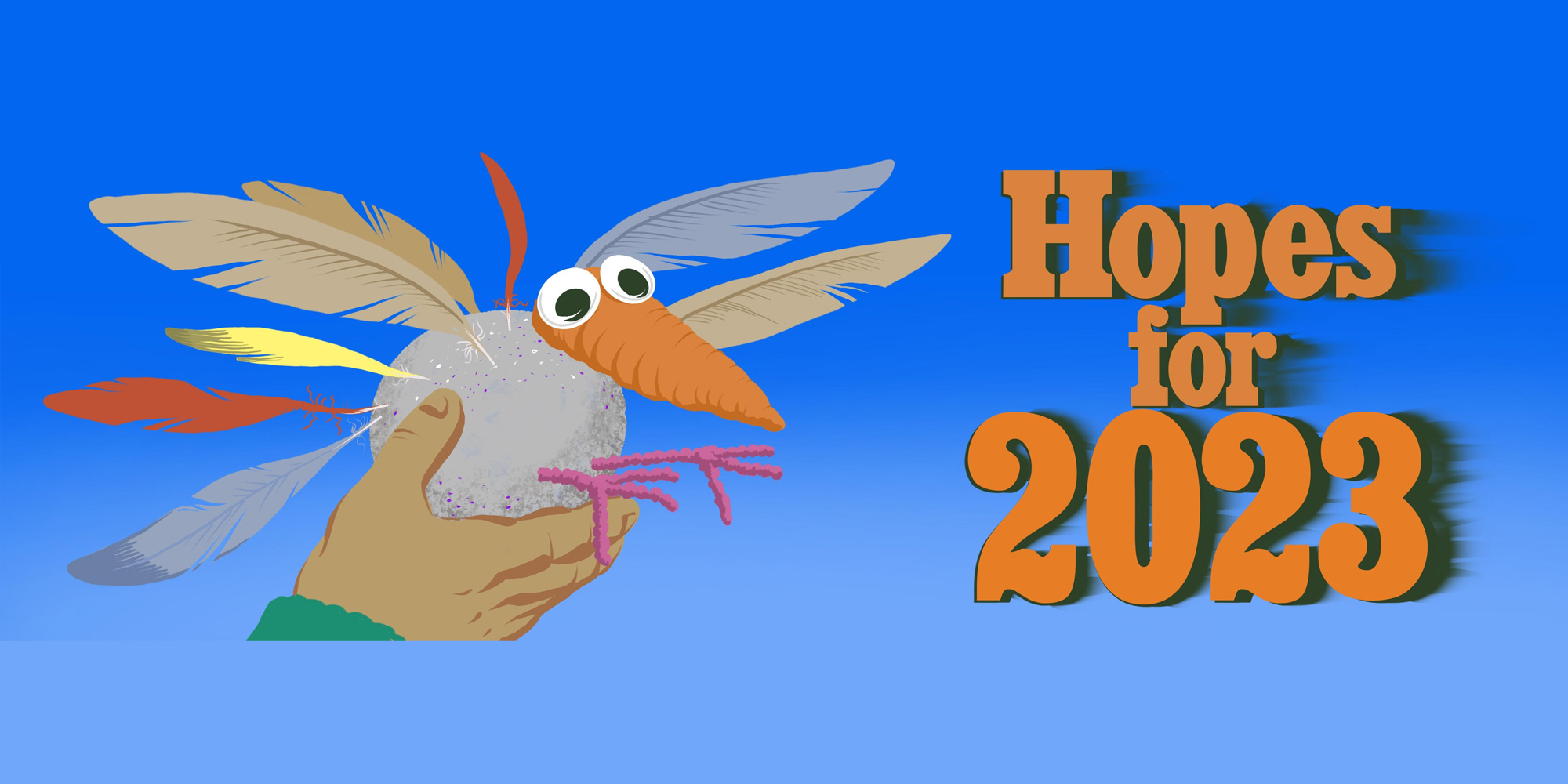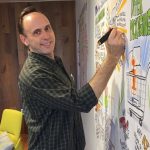Hope, wrote Emily Dickinson, is the thing with feathers. To which we would add glitter, glue, googly eyes and the whole arts and crafts drawer. We asked early childhood leaders and friends about their hopes for 2023. Here are their responses.
“My hope for 2023 is to bring all the deep reflection and insights from the pandemic forward into living a life that is more intentional, and appreciating all that we can do now that we couldn’t do during the pandemic.”
—Tiffany Shlain, artist, author and filmmaker (read “Embrace Beauty, Be Present, Always Carry a Notebook”)
“There are certainly tremendous challenges confronting the field of education these days, but I believe that the pressure of these issues is pushing all of us toward increased collaboration. This is the only path forward—and I am profoundly hopeful because it is happening. Using all of First Book’s educator-driven models, we’re able to advocate for and deliver the critical books and resources that educators need to do their jobs and further equal access to quality education.”
—Kyle Zimmer, President and CEO, First Book (read “A New Coalition Promotes Children’s Self-Esteem through Diverse Books”)
 “I am hopeful for a continued acknowledgement of the value of the early education workforce that results in their increased wages and benefits. I am also hopeful for sustained investments in the early education workforce that go beyond the important, but limited, short-term wage increases some have experienced since the start of the pandemic.”
“I am hopeful for a continued acknowledgement of the value of the early education workforce that results in their increased wages and benefits. I am also hopeful for sustained investments in the early education workforce that go beyond the important, but limited, short-term wage increases some have experienced since the start of the pandemic.”
—Ola Friday, Director, Early Educator Investment Collaborative (read “Eliminating Structural Inequities in Workforce Preparation”)
“2023 is a year for two ‘must-dos’ in the early learning arena. Must-do #1 is to make sure that investing in quality child care, preschool, family leave and preventive health re-surface as top priorities for policymakers. The U.S. has fallen down on these commitments compared to all of our economic competitors. Must-do #2 is to accelerate innovation in the field, especially around the use of tech and media that can now effectively connect and enhance learning at home, in communities and schools.”
—Michael H. Levine, Senior Vice President, Learning and Impact, Noggin (read “Lessons from the History of Children’s Television, the Original Distance Learning”)
“I have two hopes for 2023: one, that young children get the support and skills they need to thrive in school, and two, that we can better support and elevate early childhood educators so they feel valued and rewarded for the incredible work they do.”
—Megan McClelland, Hallie Ford Director for the Center for Healthy Children and Families, Oregon State University (coming soon to Early Learning Nation, a look at the new The Early Learning System Initiative)
 “There is a growing awareness that attainable property ownership (or lack thereof) affects community stability and growth—and that children see and feel these factors. After hearing my recent interview on NPR’s Marketplace, Sen. Jeff Merkley (OR) recently introduced legislation meant to restrict the number of homes that corporations can own. It’s not going to solve the issue of predatory speculation, but it’s a step in the right direction, and it gives me hope when people in positions of power listen, learn and act.”
“There is a growing awareness that attainable property ownership (or lack thereof) affects community stability and growth—and that children see and feel these factors. After hearing my recent interview on NPR’s Marketplace, Sen. Jeff Merkley (OR) recently introduced legislation meant to restrict the number of homes that corporations can own. It’s not going to solve the issue of predatory speculation, but it’s a step in the right direction, and it gives me hope when people in positions of power listen, learn and act.”
—Majora Carter, real estate developer and author, Reclaiming Your Community (read “Building Life-Giving Places”)
“I’m always astonished how capable our young learners are when we give them challenging but achievable tasks and activities. My hope for the future is that we begin to recognize that children’s enormous potential lays outside their socio-economic status, and that we see all children as highly able to achieve beyond our expectations.”
—Susan Neuman, Professor of Childhood and Literacy Education, New York University (read about her “intentionally designed everyday spaces” for early literacy)
“We must continue to prepare resources and curriculum, both inside the classroom and through media like Noggin, that will teach and reach the positive, powerful forces within little children in the early years. Who they are and what they are to become are already in there, and we must create the opportunities for that potential to develop. We must listen and learn as they learn, in order to guide and provide the best environment for physical and mental well-being. Education aids in this transformation!”
—Darryl “DMC” McDaniels, rap legend and literacy champion (read “Reading Prepares You for Your Destiny”)
“Early childhood education has a beautifully profound impact on children’s learning, both through high-quality classrooms and media programming like Noggin Knows! My hope for 2023 is that even more children will be able to gain access to our work. But, to be successful in nurturing all kids, we need to further support the early childhood workforce, so that the number of effective educators increases. Early childhood learning builds the future of a child. Through my work in educational media, I hope to help shape the futures of millions of children’s lives!”
—Emmanuel Carter, Noggin Knows host (read “One Big Learning Adventure”)
“I feel hopeful and motivated whenever I talk with our partners in the Ideal Learning Head Start Network—providers around the country creating beautiful, inclusive early learning environments for our youngest community members and their families. These playful, joyful, equitable learning environments should be every child’s birthright, and I hope we are even bolder in 2023 as we build momentum toward this vision.”
—Ellen Roche, Chief Media & Philanthropy Officer, Trust for Learning (read “Maria Montessori Myth Busting”)
“America took a step to a return to decency and civility in 2022 with many of the midterm election results. My hope for 2023 is that we continue this march against the grain and celebrate leaders and citizens with the courage to set aside tribal political differences, get to know one another, respect one another and get things done together.”
—Rye Barcott, Co-Founder and CEO, With Honor (read “The Five Percent Rule”)
“My hope for the new year is that people realize that some of the best education resources for their children are free.”
—Sal Khan, founder, Khan Academy (read the Early Learning Nation interview)
“I am hopeful that we will listen to, learn from and depend on the wisdom of diverse leaders in the field of Early Childhood. I am hopeful that the impacts of climate change and technology on young children will grow in importance and cultural relevancy will be the centerpiece of discussions on quality.”
—Leah Austin, President and CEO, National Black Child Development Institute (read more about this organization next year in Early Learning Nation)
“As we look forward to 2023, I ask that you please remember the number 15. Multiple studies indicate that approximately 15% of the population has physical or cognitive special needs. If you do the math, the numbers of children and adults needing help are huge. Thus, the opportunities to assist fragile individuals among us are innumerable. My fervent hope for 2023 is that we continue to achieve success toward creating a movement that focuses on a more-inclusive world.”
—Gordon Hartman, founder, Morgan’s Wonderland (read the Early Learning Nation interview)
 “My hope for this year is that more people engage in caring for the needs of others in their own communities, that more people see each other as neighbors rather than strangers. I hope there will be an explosion of compassion in this country and that my work—my organization’s work—can be a bridge where people from across vast ideological divides can work together, ensuring that everyone in their communities is safe, sheltered and nourished.”
“My hope for this year is that more people engage in caring for the needs of others in their own communities, that more people see each other as neighbors rather than strangers. I hope there will be an explosion of compassion in this country and that my work—my organization’s work—can be a bridge where people from across vast ideological divides can work together, ensuring that everyone in their communities is safe, sheltered and nourished.”
—Lynette Johnson, Executive Director, The Society of St. Andrew (read the Early Learning Nation interview)
“I am so encouraged by the sea change in the way that policymakers, the media and families view the urgency of building and financing care systems that work for all of us, whether we work in the care professions, provide care to loved ones, or need care for ourselves or family members. I am hopeful that in the coming years we will build a powerful movement that will win transformative public investments in care for all with respect and equity.”
—Anna Shireen Wadia, Executive Director, Care for All with Respect and Equity Fund (read “Meeting the Moment”)
“My hope is that we broaden our appreciation for how intertwined our lives are with each other’s and stop seeing investments that advance racial, gender and economic equity as zero-sum, when they are, in fact, good for us all. All communities benefit when families are guaranteed access to quality care provided by people with good jobs (including parents and other caregivers using paid leave to care for loved ones), because care fuels our economy. Hopefully, more people will appreciate that a more prosperous and just world can and should go hand-in-hand.”
—Indivar Dutta-Gupta, President and Executive Director, Center for Law and Social Policy (read “For Families and Children, a Champion for Democracy and ‘Constructive Disagreements’”)





